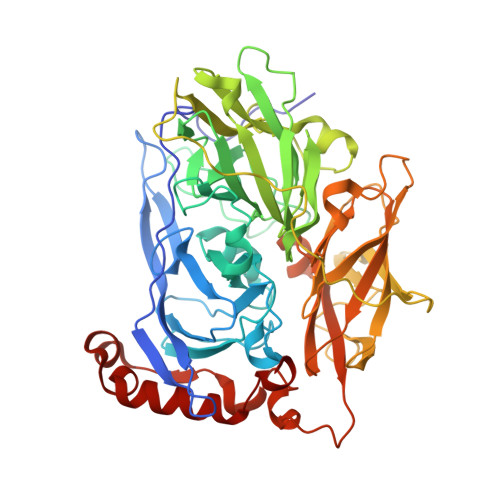Redox Potential-Dependent Formation of an Unusual His-Trp Bond in Bilirubin Oxidase.
Akter, M., Tokiwa, T., Shoji, M., Nishikawa, K., Shigeta, Y., Sakurai, T., Higuchi, Y., Kataoka, K., Shibata, N.(2018) Chemistry 24: 18052-18058
- PubMed: 30156345
- DOI: https://doi.org/10.1002/chem.201803798
- Primary Citation of Related Structures:
6IQX, 6IQY, 6IQZ - PubMed Abstract:
Bilirubin oxidase (BOD) belongs to the family of blue multicopper oxidases, and catalyzes the concomitant oxidation of bilirubin to biliverdin and the reduction of molecular oxygen to water via a four-electron reduction system. The active sites of BOD comprise four copper atoms; type I copper (T1Cu) forms a mononuclear site, and a cluster of three copper atoms forms a trinuclear center. In the present study, we determined the high-resolution crystal structures of BOD from the fungus Myrothecium verrucaria. We investigated wild-type (WT) BOD and a BOD mutant called Met467Gln, which is inactive against bilirubin. The structures revealed that a novel post-translational crosslink between Trp396 and His398 is formed in the vicinity of the T1Cu site in WT BOD, whereas it is absent in the Met467Gln mutant. Our structural and computational studies suggest that the His-Trp crosslink adjusts the redox potential of T1Cu to that of bilirubin to efficiently abstract electrons from the substrate.
Organizational Affiliation:
Department of Picobiology, Graduate School of Life Science, University of Hyogo, 3-2-1 Koto, Kamigori-cho, Ako-gun, Hyogo, 678-1297, Japan.


















